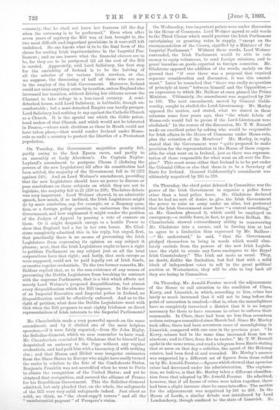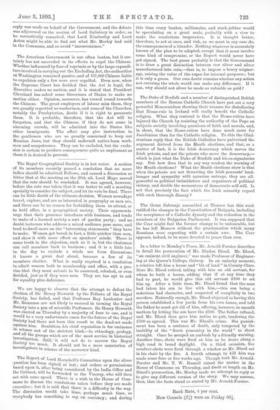On Thursday, Mr. Arnold-Forster moved the adjournment of the House
to call attention to the condition of Clare, Kerry, and Limerick, in which, according to him, crime has lately so much increased that it will not be long before the point of saturation is reached,—that is, when the moonlighters have so completely terrorised a district that it is no longer necessary for them to have recourse to crime to enforce their commands. In Clare, there had been no less than seventeen serious outrages committed since March 2nd. Since Mr. Morley took office, there had been seventeen cases of moonlighting in Limerick, compared with one case in the previous year. "In Kerry, crimes had in the same time increased from ten to nineteen; and in Clare, from five to twelve." Mr. T. W. Russell spoke in the same sense, and read a telegram from Ennis stating that at noon on that day a solicitor, the agent of the Moloney estates, had been fired at and wounded. Mr. Morley's answer was supported by a different set of figures from those relied on by Mr. Arnold-Forster,—figures which showed that agrarian crime had decreased under his administration. The explana- tion, we believe, is that Mr. Morley takes a different classifica- tion from that adopted by Mr. Arnold-Forster. He admitted, however, that if all forms of crime were taken together, there had been a slight increase since he came into office. The motion for the adjournment was negatived by 241 to 203. In the House of Lords, a similar debate was introduced by Lord Londonderry, though confined to the state of Limerick. No reply was made on behalf of the Government, and the debate was adjourned on the motion of Lord Salisbury in order, as he sarcastically remarked, that Lord Kimberley and Lord Acton might be able to find out what Mr. Morley had said in the Commons, and so avoid "inconvenience."







































 Previous page
Previous page